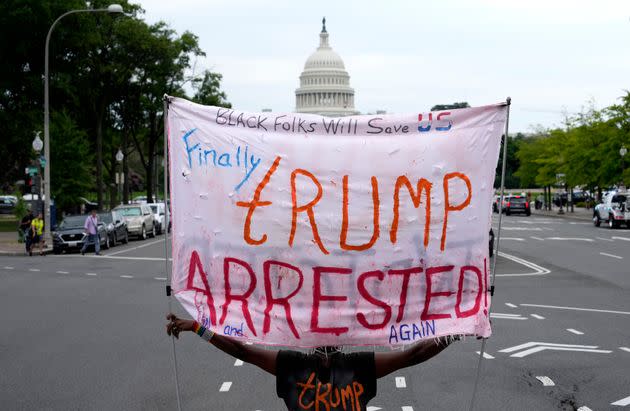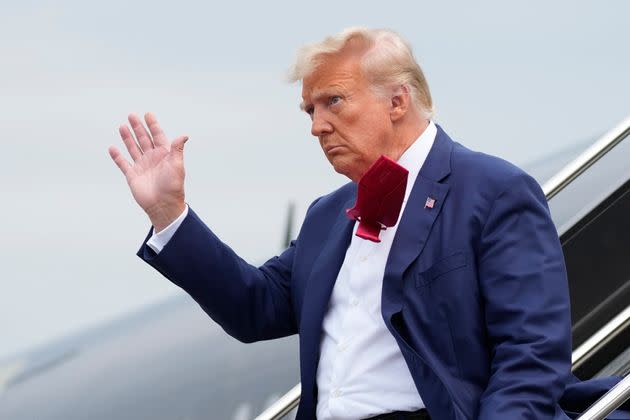The GOP's New Trump Standard: You Can Only Prosecute Him In Red Areas
- Oops!Something went wrong.Please try again later.
- Oops!Something went wrong.Please try again later.
Former President Donald Trump and his allies have responded to his latest criminal case by arguing for a change of trial venue from Washington, D.C., to West Virginia, claiming without evidence that the potential jury pool and the judge overseeing the matter can’t be impartial.
“The latest Fake ‘case’ brought by Crooked Joe Biden & Deranged Jack Smith will hopefully be moved to an impartial Venue, such as the politically unbiased nearby State of West Virginia!” Trump wrote Wednesday on his Truth Social website, referring to the Democratic president and the Justice Department special counsel.
“IMPOSSIBLE to get a fair trial in Washington, D.C., which is over 95% anti-Trump, & for which I have called for a Federal TAKEOVER in order to bring our Capital back to Greatness,” he added.
The trial should be moved to West Virginia because the state is “much more diverse” than Washington, Trump lawyer John Lauro said on CBS.
Sen. Lindsey Graham (R-S.C.), the top Republican on the Senate Judiciary Committee, also argued Wednesday that “any conviction” against Trump won’t be legitimate in the nation’s capital — where he has been charged with federal crimes relating to the Jan. 6, 2021, insurrection — and accused U.S. District Judge Tanya Chutkan, who is Black and was nominated by former President Barack Obama, of being biased against Trump.
Recent census data shows that Washington is 45% Black, while West Virginia is 93% white. In 2020, Washington voted heavily for Biden while West Virginia swung heavily for Trump.
While the partisan argument is explicit, the racial subtext isn’t hard to see: A predominantly Democratic and Black city and a Black judge are supposedly unable to dispense justice fairly, unlike a predominantly Republican and white state where Trump is popular. This subtext also mirrors the way that Trump’s alleged scheme to overturn the 2020 election sought to reject votes cast in Black communities, like Detroit and Atlanta, as inherently fraudulent.

Former President Donald Trump was arrested Thursday on charges related to efforts to overturn the 2020 election results. He wants a venue change from Washington, D.C., because the city votes heavily for Democrats.
A change of venue would be hard to win, since Supreme Court and D.C. Circuit Court of Appeals precedents require showing “extraordinary local prejudice” against the defendant that is unique to the local region.
“It’s difficult to understand how a request for a venue change could be justified in this instance, as such a request ignores the fact that the indictment [against Trump] describes criminal activity that took place almost entirely in DC and activity that was initiated by Trump while he was based in DC,” Praveen Fernandes, vice president for the Constitutional Accountability Center, a liberal legal nonprofit, said over email.
“Such a venue change request would also ignore the fact that our legal system has processes in place to assess and minimize the bias of potential jurors.”
The charges against Trump include conspiracy to defraud the United States, conspiracy to obstruct an official proceeding, obstruction of and attempt to obstruct an official proceeding, and conspiracy against rights, according to Smith.
Trump has been charged in D.C. because the unprecedented efforts to overturn the election he lost were centered in the nation’s capital. The 45-page federal indictment cites dozens of conversations and meetings Trump had at the White House with his former vice president and other Cabinet officials.
At the heart of Trump’s potential request for a change of venue is the Sixth Amendment’s requirement that a trial be held in “the state and district” where the alleged crime was committed and that the defendant receive a fair trial by an “impartial jury.” Trump and his lawyers argue that Washington cannot produce an impartial jury because of the political affiliation of the potential jury pool and the media saturation of the alleged crimes in the area.
Trump will run into a number of serious problems in trying to force a venue change. His first obstacle is that every motion for a venue change by Jan. 6 insurrectionists, including the high-profile sedition trials of the leaders of the right-wing gangs the Proud Boys and the Oath Keepers, has failed.
The reason for these failures is that court precedents make it extremely difficult to succeed. Such motions require a showing of extraordinary local prejudice, the Supreme Court ruled in Skilling v. United States. That 2010 case saw Enron executive Jeffrey Skilling try and ultimately fail to have his conviction overturned on grounds that media reports had biased the local jury. And extraordinary local prejudice is very hard to prove, even in highly emotional and broadly publicized cases.
Skilling failed to show such prejudice despite the Enron case’s publicity and impact on the local economy. Dzhokhar Tsarnaev, the Boston Marathon bomber, failed as well despite his actions resulting in the deaths of three people, the wounding of hundreds and a citywide lockdown during the search for him and his brother. Ramzi Yousef, the 1993 World Trade Center bomber whose attack killed several, also failed to win a venue change in his case.
The most significant case where a defendant won a bid to change the venue happened in the case of Oklahoma City bombers Timothy McVeigh and Terry Nichols. A judge found that the local press coverage had grown more emotional than the national coverage. It developed a tone of state and local pride, combined with demonization of McVeigh and Nichols, that created “so great a prejudice” that the venue was changed to Colorado. The potential for a death sentence also weighed on this decision.
The most pertinent case, though, is likely that of the Watergate defendants in Haldeman v. U.S. Here, former officials in the Richard Nixon administration who took part in the Watergate schemes appealed to the D.C. Circuit Court of Appeals, arguing that they did not receive a fair trial since the heightened publicity of the case — amid televised congressional hearings and nonstop front-page coverage in The Washington Post — made it impossible to impanel an impartial jury.

Trump waves as he steps off a plane on his way to Washington to face federal conspiracy charges alleging that he conspired to subvert the 2020 election.
In a 5-1 ruling, the appeals court rejected the Watergate defendants’ argument that they did not receive a fair trial. The court first ruled out the suggestion that the defendants should have been granted a venue change prior to jury selection, and it rejected the argument that the jury pool as selected was not impartial.
The court cited a “common-sense standard” for juror selection established in the 1961 case of Irvin v. Dowd. That standard states that “it is not required … that the jurors be totally ignorant of the facts and issues involved.” Instead, “it is sufficient if the juror can lay aside his impression or opinion and render a verdict based on the evidence presented in court.”
Turning to the jury selection process itself, the court found that most jury panel members “simply did not pay an inordinate amount of attention to Watergate.”
“This may come as a surprise to lawyers and judges, but it is simply a fact of life that matters which interest them may be less fascinating to the public generally,”wrote the appeals court majority.
The solo dissent in Haldeman by Judge George MacKinnon, a Nixon appointee, is notable because it touched on some of the very questions that Trump is likely to raise. Despite the defendants never pointing to the issue of political bias, MacKinnon independently argued that D.C. could not produce an impartial jury for a trial of Republican political figures because of the district electorate’s support for Democrats.
“In Washington, D.C., there most emphatically does appear to be a unique island of political bias, and in this case, with its massive political aspects, it would be futile to ignore the possibility that prior to the trial potential jurors may have formed prejudgments of the case based on their political affiliation or leanings,” MacKinnon wrote.
The partisan lean toward Democrats in Washington has only grown since MacKinnon’s opinion. In 1972, Democrat George McGovern received 78% of the vote there, compared with the 92% won by Biden.
This issue of whether a region’s dominant partisan affiliation can create conditions inhospitable to the impaneling of an impartial jury did not come up much after Watergate until the cases of the Jan. 6 insurrectionists.
One motion for a venue change by Thomas Caldwell, a member of the Oath Keepers who stormed the Capitol on Jan. 6, said that he could not receive a fair trial because “the overwhelming majority of District residents despised Caldwell and his co-defendants before January 6th.”
“District residents not only despise Caldwell’s politics—they despise many things that traditional America stands for,” stated the motion, which was denied. “District residents, who largely style themselves as chic, sophisticated, worldly, high-brow urbanites, are repulsed by rural America’s traditional values, patriotism, religion, gun ownership, and perceived lack of education.”
Many other filings for venue changes by Jan. 6 defendants made less polarizing characterizations, but were also shot down by multiple D.C. District Court judges for a variety of reasons, including the argument that the area was too saturated by news of the event. Judges regularly cited the Supreme Court’s decision in Skilling.
“Prominence does not necessarily produce prejudice, and juror impartiality, we have reiterated, does not require ignorance,” then-Justice Ruth Bader Ginsburg wrote for the majority in that case.
But the Supreme Court has not heard arguments like those made in either the Watergate case — that pretrial publicity through congressional hearings particularly biases a Washington jury — or the Jan. 6 insurrectionist cases — that too many D.C. residents are Democrats for a Republican to get a fair trial.
Considering Trump’s past history in courts both during and before his presidency, it should be expected that these issues get appealed up to the Supreme Court. That will no doubt further drag out these cases — likely a key goal of Trump’s, as he seemingly hopes to win the 2024 presidential election so he can pardon himself.
